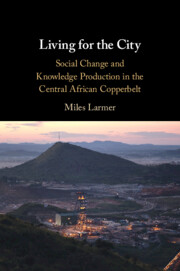Crossref Citations
This Book has been
cited by the following publications. This list is generated based on data provided by Crossref.
Lämmert, Stephanie
2021.
Fluid Feelings.
p.
21.
Peša, Iva
2022.
A Planetary Anthropocene? Views From Africa.
Isis,
Vol. 113,
Issue. 2,
p.
386.
Bourel, Étienne
and
Vadot, Guillaume
2022.
Le salariat, un objet devenu (trop) discret en études africaines.
Cahiers d'études africaines,
Vol. 245-246,
Issue. ,
p.
9.
Peša, Iva
2023.
Anthropocene Narratives of Living with Resource Extraction in Africa.
Radical History Review,
Vol. 2023,
Issue. 145,
p.
125.
2023.
The Urban Question in Africa.
p.
199.
Larmer, Miles
Majima, Shinobu
and
Khaitan, Urvi
2024.
Decolonising the ‘Long Boom’: New Histories of the Global South, 1945–1990.
The Journal of Imperial and Commonwealth History,
Vol. 52,
Issue. 6,
p.
871.
Majima, Shinobu
and
Tambayang, Imelda
2024.
The Household Reckoning: Farming Families and the Female Fieldworker in Late Colonial Borneo.
The Journal of Imperial and Commonwealth History,
Vol. 52,
Issue. 6,
p.
936.
Manias, Chris
2024.
Handbook of the Historiography of the Earth and Environmental Sciences.
p.
1.
Reeves-Evison, Theo
2024.
On Prospecting.
Environmental Humanities,
Vol. 16,
Issue. 3,
p.
603.
Oestermann, Tristan
2024.
Kings of Quinine: The Pharmakina Company and West German Pharmaceutical Production in Postcolonial Zaire During the Long Boom.
The Journal of Imperial and Commonwealth History,
Vol. 52,
Issue. 6,
p.
885.
Manias, Chris
2024.
Handbook of the Historiography of the Earth and Environmental Sciences.
p.
1.



